US fast-food workers stage nationwide strike
- Published
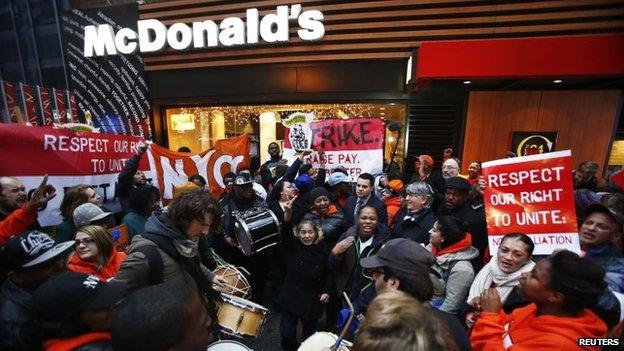
Protestors are calling for a federal minimum wage rise to $15 (£9) per hour, up from the current $7.25
Fast-food restaurant workers across the US are staging a 24-hour strike in protest against low wages.
Walkouts were reported in New York, Chicago, Washington DC, and also Detroit, Michigan; Raleigh, North Carolina; and Pittsburgh, Pennsylvania.
Organisers hoped workers in as many as 100 cities will participate in what is the latest in a series of such actions.
Unions want a $15-an-hour (£9.19) federal minimum wage. The current one, set in 2009, is $7.25 per hour.
President Barack Obama, who has backed a Senate measure to increase the minimum to $10.10, specifically mentioned fast-food workers "who work their tails off and are still living at or barely above poverty", in an economic policy speech on Wednesday.
'We can't survive'
His Democratic allies, who control the upper chamber of Congress, have said a vote on the matter could be held this month.
But even if it passes the Senate, it is not clear if it would be approved by the Republican-led House of Representatives.

Nearly 100 protestors gathered around a Wendy's restaurant in Brooklyn, New York, at midday, carrying signs saying "stick together for $15/hr".
Shaquena Davis told the BBC she worked at the fast-food restaurant, making $7.25.
"I got kicked out of school because I couldn't pay the bill," she said. "I'm living in a one-bedroom apartment with five people."
Kachelle Krump, 23, works at a Burger King in the area. She told the BBC she works 16 to 20 hours a week and would like more hours, but that management had been unhelpful.
"I have a child who is seven years old - she's in school, she needs things," said Ms Krump.
Of her employer, Burger King, she said: "It's a billion dollar company. Share a little."
In Detroit, about 50 demonstrators turned out for an early morning rally in front of a McDonald's, including a handful of employees who walked off the job. However, the restaurant stayed open.
Another 40 demonstrators rallied at a Burger King in Atlanta.
The American fast-food industry has come under increasing scrutiny because part-time jobs, including retail and food positions, have made up most of the job growth since the recession.
It is not yet clear how many fast-food restaurants will be affected by Thursday's industrial action.
The workers' last nationwide strike, in August, was patchy, with some restaurants appearing to function normally while others were unable to do business.
The National Restaurant Association, an industry lobbying group, called the strikes a "campaign engineered by national labour groups", claiming the vast majority of participants were in fact union protestors.
The association said firms already face "great uncertainty".
"Calls to double the minimum wage only intensify the challenges faced by job creators."
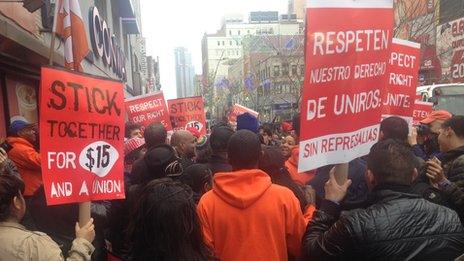
Protesters held a midday strike outside a Wendy's restaurant in Brooklyn
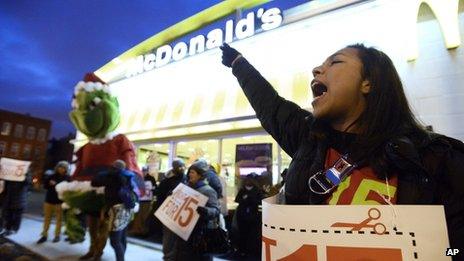
Protesters picketed outside a Chicago, Illinois, McDonald's on Thursday
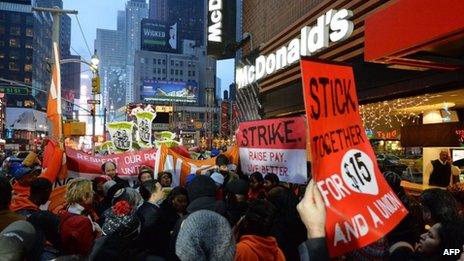
Dozens of people protested outside a New York City McDonald's
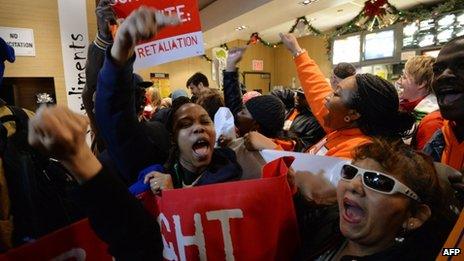
Demonstrators at the Times Square McDonald's
This week, a measure in the tiny airport town of SeaTac, Washington state, to raise the minimum wage to $15 per hour passed by 77 votes, external.
As a result, some 6,300 workers at SeaTac's airport, which primarily serves the region's largest city, Seattle, will be paid the highest minimum wage in the nation.
Saba Belachew is one of those workers. She told the BBC: "It will really change my life. I don't have to work two jobs. [I can] support my family, go back to school. I'm so excited."
However, Alaska Airlines, the airport's biggest airline, has sued to block the measure.
Regardless, union organisers in SeaTac said they were hoping the success of their vote would inspire workers protesting around the nation.
"What we need is a social movement in this country that says enough is enough," said David Rolf, the president of the local Service Employees International Union.
SeaTac in Washington state could become the first US city to introduce a "living wage", as Samira Hussain reports
- Published5 December 2013
- Published5 November 2013
- Published5 November 2013